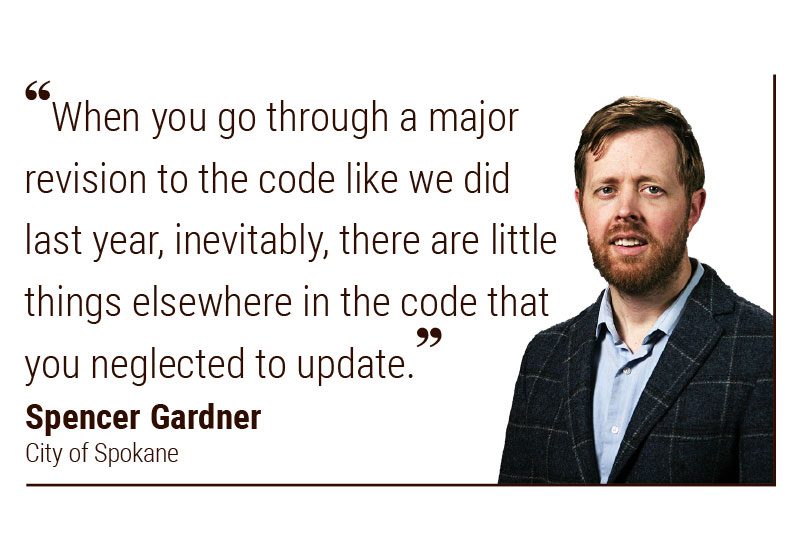
New codes set residential zone-change standards
Residential permit activity reaches 10-month record

As the city of Spokane rounds out its first year since adopting the new Building Opportunity for Housing zoning designation meant to allow for higher density in residential areas, city planners work to fix issues within the code.
Spencer Gardner, planning director for the city of Spokane, says the planning department has been watching submitted applications closely since the city implemented the Building Opportunity for Housing zoning and has been drafting different code options for the city planning board to consider that will make it easier to build housing.
As previously reported by the Journal, the Spokane City Council passed a set of zone changes initially named Building Opportunity and Choices for All in 2022 that would allow up to four units on all single-family lots. The city expanded upon them in November 2023 to allow for up to six multifamily units within residential zones near public transit, updating the designation name to the current Building Opportunity for Housing title.
The zone changes were made in response to Spokane’s critical housing crisis and were aimed at creating more missing middle housing—anything that falls into the gap between a single-family house and a large apartment building—which had been discouraged in recent decades through regulations that prioritized single-family housing, Gardner says.
The city now is working to make land-use codes fit the Building Opportunity for Housing zoning.
“When you go through a major revision to the code like we did last year, inevitably, there are little things elsewhere in the code that you neglected to update,” Gardner says. “A lot of it is just clarity and tweaks.”
For example, the City Council recently adopted code changes that eliminate the requirement for property owners to provide off-street parking, allowing property owners to choose how much parking they want to provide on their sites, though older language can still be found in certain parts of codes, leading to confusion from builders.
More substantial code changes involve creating complementary design standards for all types of housing within residential neighborhoods. Such requirements call for buildings to have front-facing doors, standards for the placement of garages, and standards for windows on front-facing facades.
“We’re introducing some changes that we think will increase the flexibility while ensuring that again we’re getting buildings that contribute to the vibrancy of the neighborhood,” Gardner says.
The city has issued permits for projects using the new code. However, they are mostly small in scale with two to four units, and not clustered in one neighborhood.
“I can’t point to one particular location where you could see dozens of these projects happening,” Gardner says about distinct Building Opportunity for Housing permits. “We actually see that as a good thing.”
The adopted housing changes were prompted by House Bill 1110 which calls for certain communities across Washington state to allow up to six units on residential lots, although Gardner says the city of Spokane had long been working on creating more missing middle housing before the house bill was enacted.
In February, Gov. Jay Inslee presented the city of Spokane with the 2023 Smart Communities Award for its approach to housing through the Building Opportunity and Choices for All pilot program.
One of the selling points of the Building Opportunity for Housing zoning is a promise to the community that it wouldn't result in massive overnight changes to their neighborhoods, Gardner says.
“What we heard pretty quickly is that people are welcoming of more housing, but they are concerned about housing that appeared out of scale with their neighborhood or disproportionately impacted their neighborhood,” he says.
Permits for multifamily housing units totaled 1,007, up from 937 in 2023, 438 in 2022, 486 in 2021, and 150 in 2020.
Permits for single-family residences this year totaled 276 through October, the highest 10-month permit total for single-family homes since 2021, when 309 permits were issued.
The top-growing neighborhoods include Cliff/Cannon, Southgate, East Central, and Lincoln Heights, which had a total of 718 residential units issued year-to-date through October 31.
According to the city of Spokane’s latest building permit activity report for the year through October, the city has issued building permits for 1,354 housing units, breaking the record of 1,340 housing units permitted in the year-earlier period.
The total job values for all construction permits through October also hit a new record of $704.7 million, breaking 2022’s 10-month record of $659.3 million, according to city data.




